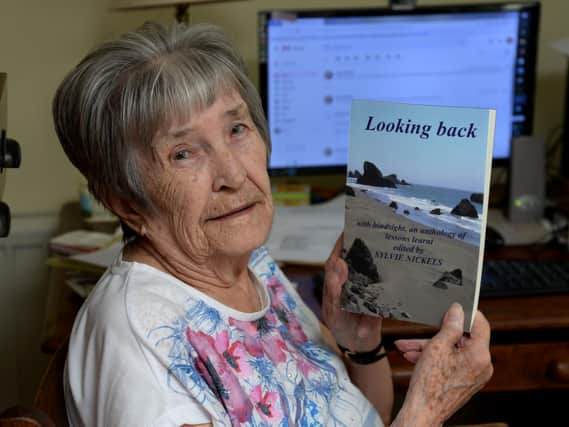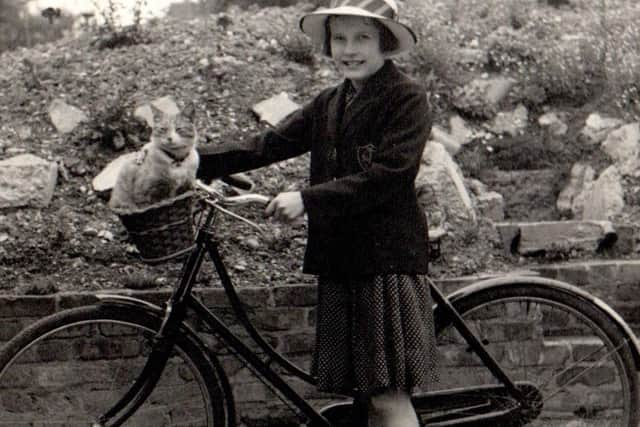Coronovirus - Banbury author, 90, compares today's emergency to wartime conditions in Britain


Sylvie Nickels, who now lives in Banbury, was reminded of the privations of wartime when the coronavirus began to show a tightening of our liberties. In spite of the differences in the two emergencies she felt compelled to offer an account of what life was like then in an article called Eighty Years On.
It was written a week before the Prime Minister announced a full lockdown.
Advertisement
Hide AdAdvertisement
Hide Ad"There is a strange sense of déja vu about the current coronavirus crisis for this old lady on the verge of ninety.


"As I queued up yesterday at the check-out in one of our supermarkets behind trolleys stacked high with sixteen-roll packs of loo paper, I thought back to the days when I was an indestructible ten-12-year-old in the middle of World War Two.
"Apart from the unpredictability of life, it wasn’t the same of course. No piled-up trolleys - nor, come to think of it any supermarkets then. We had the benefit of rationing, though I recall the benefits of our puny sweets allowance did not seem immediately obvious to my very young sweet-toothed self at the time. But there was a distinct sense of camaraderie among those of us coping with the unexpected, chatting, smiling, commiserating with each other, as people do when they find themselves in the same confusing boat.
"Of course. Corvid-19 still has a degree of novelty about it unlike the war which soon felt endless: certainly, long enough for us to have learned to adapt, to find way round things. Or Mum did: making edible things out of those ghastly dried eggs that always tasted as if they had been on the shelf for a very, very long time. But then Mum was something of an adaptor per se. Being Swiss and cut off from her family for ‘the duration’, apart from censored letters, she had established a code with her favourite sister. Thus ‘brief visits’ from cousin Alphonse could indicate we had had some air raids but no damage, while a tiresome visit from him might translate into broken windows or a few lost tiles.
Advertisement
Hide AdAdvertisement
Hide Ad"Eighty years later, such enterprise no longer seems remotely treacherous.
"And, of course, five or more years is a long time in anyone’s life, let alone someone barely aged double that length of time. You can get used to unpredictability - believe me, you can - and find ways round its more tedious aspects. A friend and I spent hours tracking imaginary enemies, usually ending up in the local park, completely unaware that Mum had followed us to check what we were up to.
"Further hours were spent writing and exchanging adventure stories which reflected our lives in wartime suburban London. Oblivious of futures dominated by smart phones we played hopscotch on a pattern of squares chalked on to the pavement. When our snobby neighbours complained at this ‘common practice’ triggering my mother to scrub the pavement clean, I blackmailed them for sixpence and was thereafter referred to by our friendly local policeman as my father’s criminal daughter.
"On the question of unpredictability, air raids were at least predictable as we had a loud wailing warning to inform us that aircraft were on their way to bomb us. This produced the double hazard of the bombs themselves and the possibility of being hit by the splinters of anti-aircraft shells fired at the bombers to discourage them or, of course, by any aircraft that might be hit.
Advertisement
Hide AdAdvertisement
Hide Ad"Anticipation can be a mixed blessing. This continued to apply much later, in the last months of the war, when the bombers were replaced by pilot-less rockets dispatched from the Lowland countries and initially named V1 (rockets). These instruments acquired the name of Doodlebugs and it is difficult to be afraid of anything with such an absurd name: though, truth to tell, there was nothing absurd about the sight of them crossing our skies or the sudden break in their deep-throated roar signalling that their engine had cut out as they prepared to drop their noses and plunge, along with their lethal contents, to earth.
"Equally lethal but completely unpredictable were the Doodlebugs' successors, the V2s, likewise pilot-less but too swift to give forewarning. Thus, they exploded literally out of the sky as one did, in April just a few weeks before the end of the war around six o’clock one morning. The first indication was of the ceiling pattering down on my bed – not even the sound of an explosion unless it was that which awoke me and gave me time to dive under the eiderdown – no duvets in those days – dragging a koala bear named Topsy after me.
"You really can’t get more unpredictable than that."
* Sylvie Nickels' latest book is called Looking Back - a collection of short stories by herself and other people, demonstrating various lessons learned through life's experiences. For details of how to receive a copy email [email protected]